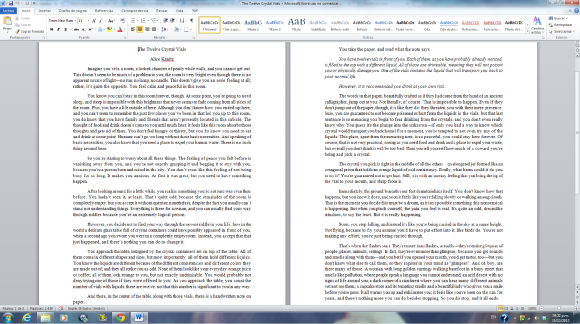Journal Entry #10: The Project’s Complete!
This journal entry is meant to be divided in three parts. First, I’ll talk about the project itself, and how I changed its specifications along the way. Second, I’ll give actual evidence of my completed project. Third, I’ll make a reflection on it.
PART ONE:
When I first started out, I thought I wanted to write a book. In the end, I really did write a book–during November, for NaNoWriMo. But since I wrote it in so little time, without giving too much thought to it, it’s not very good. It became more challenging for me to write a good short story and attempt to get it published than to write an okay novel full of mistakes. It would be more rewarding to attempt to get it published.
So I wrote a short story, and I am going to send it to various literary magazines during December and January so the project can become more meaningful to me. I’m not sure if it’s a good short story, although, all modesty aside, I think it is. The only thing I’m not sure about it is its genre–I tried to do something different, something I have never done, so it’s a bit of an odd story. It is fictional, though.
No, I don’t think it’s The Best Short Story Ever, and yes, I am almost a hundred percent sure I will only receive rejection letters back from those literary magazines I am sending the story to. But 1) it will undergo editing before it is sent and 2) I took several risks in this project. I got to interview (via email, but still) two Actual Published Authors, which is something I’d have never dreamed of doing. I wrote something I’m not used to writing–something that’s a bit odd. And during this month and the next one, I will be sending this story to magazines. My work will be read by editors and maybe even by magazine readers, not only by the few people I usually ask to review my work or a small audience on Fictionpress.net. No, I am taking risks with this project. That’s the most rewarding experience of all.
PART TWO:
I’m not sure how I should prove that my project actually exists. I guess, here’s a screenshot of the whole thing:
These are the first two pages.
(or two screenshots, you know.)
That’s the last page.
PART THREE:
I’m not exactly a “short story” kind of person. Recently, I discovered I like writing longer stuff. Writing something shorter is like a challenge to me: I have to only write the important stuff, keep it compact. So the fact that I was able to do it makes me really proud of myself. Some people may think that writing is easy, and all writers are the same. Neither of these things are true. Writing is a great mental exercise, not to mention entertaining for me, and each writer is different. Some people write better in an organised schedule, or under pressure, or writing a lot for a short period of time, or editing as they go. Others do better by writing when they’ve got the inspiration, or taking seven years to finish a single book, or writing it all first and then editing. Some writers are amazing with action-packed plots. I’m usually strong at characterisation (although that cannot be evidenced by my story and therefore the strong point of it is the plot). Some writers write short things, some write long novels, and some do both. This is one of the lessons I learned during this process. I expect to learn more while trying to get it published.
Something else I learned, that ties in with the above, is that creating something is hard. No, it’s not physically hard on you; I didn’t have to carry anything heavy or work until my legs couldn’t take it anymore. But it is mentally exhausting if you’re committed to it, and I think both kinds of exhaustion are equal in the way they’re both hard to deal with. I’ve witnessed this a lot recently. If you’ve been running hard for ages, you don’t have time to make any more mental or physical effort for a while. And when I stay up late to finish the four different projects due the next morning at school, I notice I am physically exhausted too and can’t think of anything but sleep. That’s why I believe both kinds of exhaustion are equal. When you’ve worked hard on something physical, you are also mentally exhausted, and vice-versa. So don’t come saying that people who run marathons work harder than a playwright who spent his entire career perfecting a masterpiece. Doing anything is hard, and therefore so is creating.
I had to face a writer’s Number One Enemy for a long time in this process: the infamous villain known as Writer’s Block. But I managed to defeat this dragon in my way, and finish the project, and that is how I learned most of what I said above.
I expect the process of sending the story to magazines will make me develop even more as a learner and a writer just recently getting into the game, and I’ll write more about it here. But I’ve already accomplished a lot, and I will keep working on the second stage of this project until February.
All in all, I believe so far this has been a success.
-Alice












